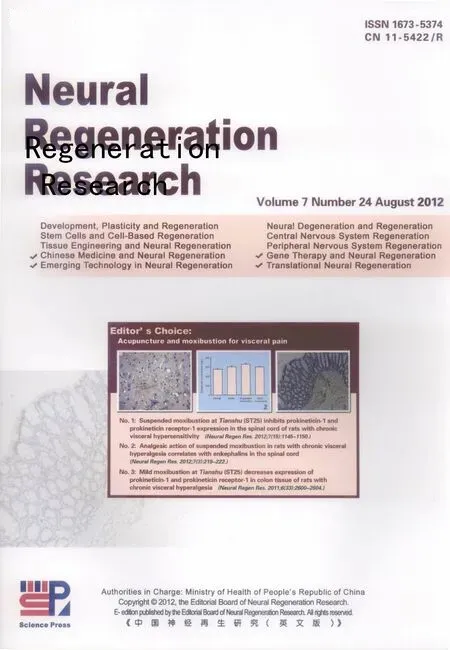Acupuncture and moxibustion for visceral pain
Acupuncture and moxibustion for visceral pain
Totally three articles focusing on “analgesic action of suspended moxibustion effect in visceral hypersensitivity rats with irritable bowel syndrome, and changes in prokineticin 1 and prokineticin receptor 1 expression in the spinal cord, enkephalins in the spinal cord and prokineticin-1 and prokineticin receptor-1 in the colon tissue during the analgesic progress” were published in three issues. We hope that our readers find these papers useful to their research.
No. 1: Suspended moxibustion at Tianshu (ST25) inhibits prokineticin-1 and prokineticin receptor-1 expression in the spinal cord of rats with chronic visceral hypersensitivity Neural Regen Res. 2012;7(15):1145-1150.

Abstract
Suspended moxibustion can decrease the expression of prokineticin-1 and its receptor in colonic tissue from rats modeling chronic visceral hyperalgesia. This study aimed to verify if rat spinal cord prokineticin-1 and its receptor contribute to the analgesic effect of suspended moxibustion in a rat model of irritable bowel syndrome where rats display chronic visceral hypersensitivity. Results showed that suspended moxibustion at Tianshu (ST25) point significantly decreased visceral sensitivity to colorectal distention in a chronic visceral hyperalgesia rat model; also protein and mRNA expression of prokineticin-1 and prokineticin receptor-1 in the spinal cord of rats was significantly decreased. Experimental findings indicate that prokineticin-1 and prokineticin receptor-1 are involved in the analgesia using suspended moxibustion in rats with chronic visceral hyperalgesia.
No. 2: Analgesic action of suspended moxibustion in rats with chronic visceral hyperalgesia correlates with enkephalins in the spinal cord Neural Regen Res. 2012;7(3):219-222.

Abstract
Rats that modeled chronic visceral hyperalgesia received suspended moxibustion at bilateral Tianshu (ST25) and Shangjuxu (ST37) once daily over a period of 7 days.Results show that suspended moxibustion significantly depressed abdominal withdrawal reflex scores and increased enkephalin concentration in the spinal cord.The experimental findings suggest that spinal enkephalins contributed to the analgesic effect of suspended moxibustion in rats with chronic visceral hyperalgesia.
No. 3: Mild moxibustion at Tianshu(ST25) decreases expression of prokineticin-1 and prokineticin receptor-1 in colon tissue of rats with chronic visceral hyperalgesia Neural Regen Res. 2011;6(33):2600-2604.

Abstract
Prokineticin-1 and prokineticin receptor-1 play important roles in visceral hypersensitivity and inflammatory pain. Visceral hypersensitivity is closely associated with irritable bowel syndrome. Mild moxibustion can relieve chronic visceral hyperalgesia in rats with irritable bowel syndrome. We hypothesized that prokineticin-1 and prokineticin receptor-1 is the key target in the mechanism. This study established chronic visceral hyperalgesia rat models by colorectal distention. Protein and mRNA expression of prokineticin-1 and prokineticin receptor-1 were determined by immunohistochemical method and fluorescence quantitative-PCR, respectively, and were found to be significantly increased in visceral hyperalgesic rats. Mild moxibustion at Tianshu (ST25) decreased prokineticin-1 and prokineticin receptor-1 expression in chronic visceral hyperalgesia rats and lessen the chronic visceral hyperalgesia in rats with irritable bowel syndrome at different levels of colorectal distention pressure.
- 中国神经再生研究(英文版)的其它文章
- Effects of wind-dispelling drugs and deficiency-nourishing drugs of Houshiheisan compound prescription on astrocyte activation and inflammatory factor expression in the corpus striatum of cerebral ischemia rats****☆
- Therapeutic effect of nerve growth factor on cerebral infarction in dogs using the hemisphere anomalous volume ratio of diffusion-weighted magnetic resonance imaging*★
- Pre-ischemia electro-acupuncture potentiates the expression of Bcl-2 and transforming growth factor-beta 1 in rat brains*☆△◇
- Yizhijiannao Granule and a combination of its effective monomers, icariin and Panax notoginseng saponins, inhibit early PC12 cell apoptosis induced by beta-amyloid (25-35)☆
- Acupuncture activates signal transduction pathways related to brain-tissue restoration after ischemic injury**☆
- No association between a polymorphism of the adenylate cyclase type IX gene and major depressive disorder in the Chinese Han population*☆

